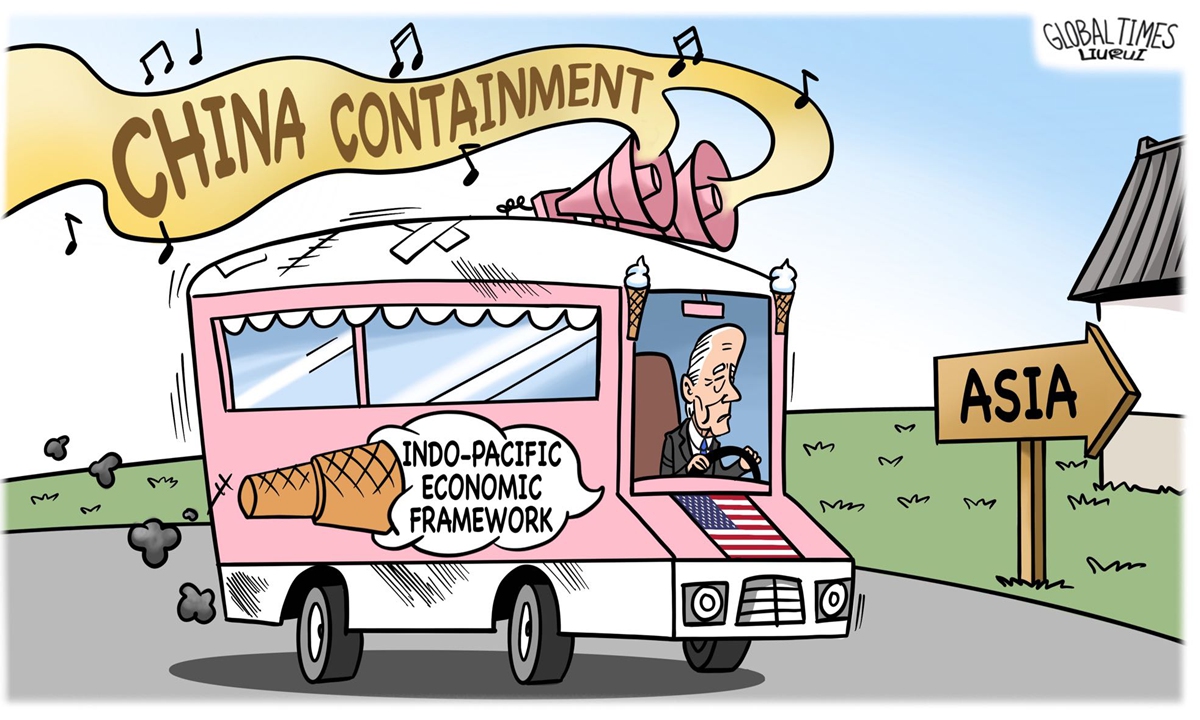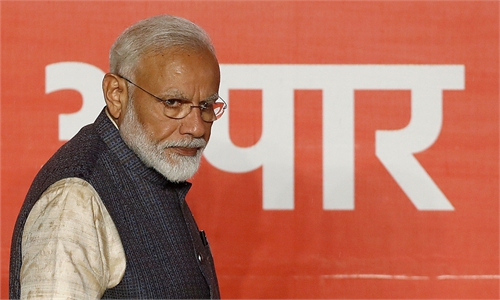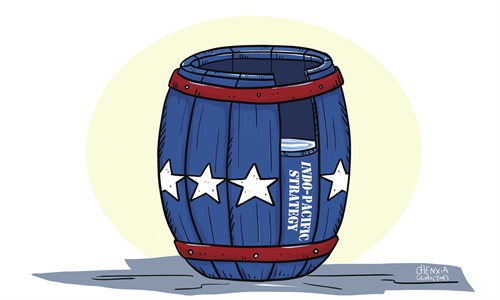
Illustration: Liu Rui/GT
One of the most important agendas during US President Joe Biden's Asian tour is the launch of the Indo-Pacific Economic Framework (IPEF), a central part of White House's Indo-Pacific Strategy. On Monday, joined in person by Japanese Prime Minister Fumio Kishida and Indian Prime Minister Narendra Modi at the launch event in Tokyo, Biden announced the launch of the IPEF. Against the backdrop of the Russia-Ukraine conflicts, the US is stepping up the construction of an Indo-Pacific strategic system to contain China. The IPEF is the economic pillar of the US Indo-Pacific Strategy and it will serve as an important tool of the US in the country's geopolitical and economic competition against China.
The framework includes four pillars: trade; supply chains; clean energy and infrastructure; and tax and anti-corruption. Along with the US, initial participants in the framework include major economies like Australia, India, Japan and South Korea, as well as developing countries, including Indonesia, the Philippines, Malaysia, Thailand and Vietnam, and smaller nations like Brunei, New Zealand and Singapore.
White House officials touted that together, those countries represent about 40 percent of the world's gross domestic product but experts are not optimistic about whether the goal of containing China can be achieved. And they warned that in the long run the framework will make regional economy more fragmented and bring nothing but division and disturbance to the region.
First of all, the biggest problem with the IPEF is that it is difficult to provide countries in the region with practical benefits in terms of market access. There are no market access or tariff reduction provisions in the framework, which lacks trade incentives that countries in the region desire. The framework only serves the geopolitical interests of the US and Japan. This determined that the IPEF cannot establish a mutually beneficial and win-win relation.
Second, under the IPEF, the Biden administration is trying to dominate the rules and standards of digital technologies like artificial intelligence and 5G. But the rules of digital trade and technology that the US wants to promote are too "American," and many countries in the region simply cannot meet the so-called high standards. The IPEF is just a "club of rich countries" and is difficult to effectively help developing countries in the region to bridge the "digital divide," experts say.
Third, it is difficult for the Biden administration to provide sufficient political and economic capital for the IPEF. Whether it is this year's midterm elections or the 2024 US elections, Biden and his Democratic Party will face severe challenges. The IPEF has not been approved by the US Congress and its political sustainability has been questioned.
Due to the lack of market access and its obvious nature of exclusive geopolitical and economic competition, added to doubts about whether the Biden administration can be re-elected, there are few countries in the Asia-Pacific region that are truly interested in it.
The only interested countries are US' Asian allies or those under Washington's political coercion and dream of enjoying the status of "second-class citizens" in the international system and global industrial supply chain dominated by the US. India plays an important role in the US' Indo-Pacific Strategy but experts warn that by joining the IPEF at the current stage of its economic development India risks becoming an economic vassal of the US forever.
The mutually beneficial and win-win cooperation between China and Asia-Pacific countries is enjoying a strong momentum. It is hard to imagine that ASEAN, India and other countries in the region are willing to take the initiative to give up relative advantages and benefits accumulated through decades of cooperation with China, not to mention cooperating with the US and Japan in containing China at their own cost.
The global economy is suffering with multiple hits of high inflation, geopolitical conflict and energy crisis, which are threatening the Asia-Pacific region too. Under these circumstances, Asia-Pacific needs cooperation, not division. The IPEF may not go very far.
The IPEF, which excludes China, is driven more by geopolitical considerations rather than economic factors. But countries in the region do not want to be trapped in the predicament of taking sides between Beijing and Washington as China is their largest trading partner. China should have confidence in facing the US' strategic containment. As long as Chinese government keeps the right direction concerning domestic and foreign policies and continues opening-up, the US will be unable to stop China's continuous rise.


